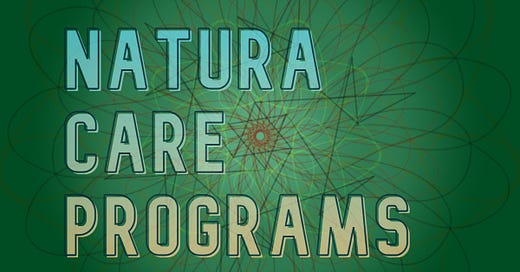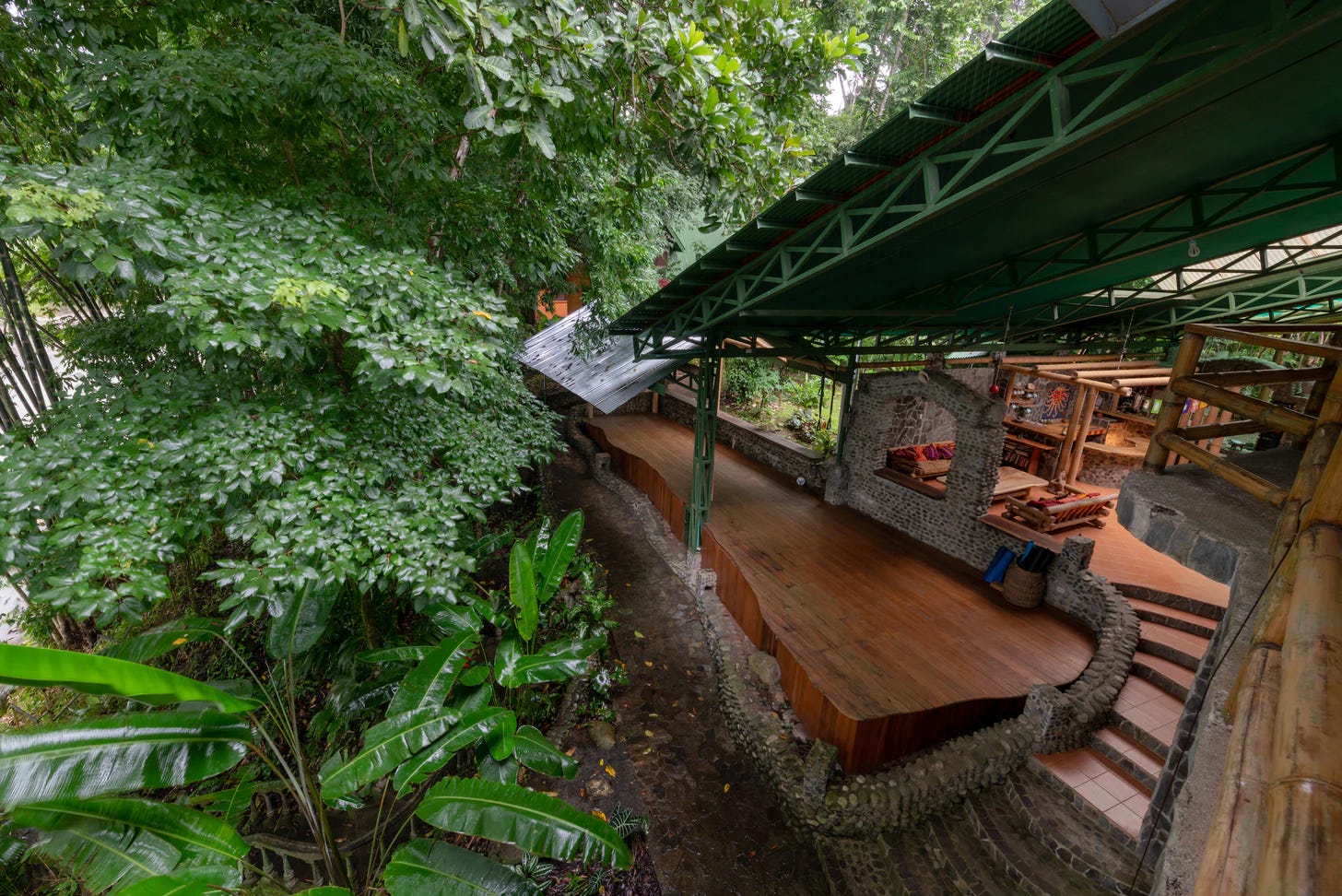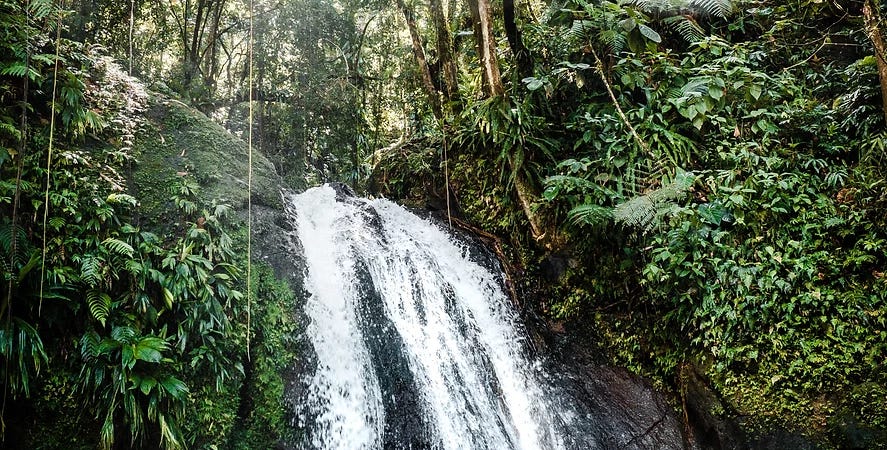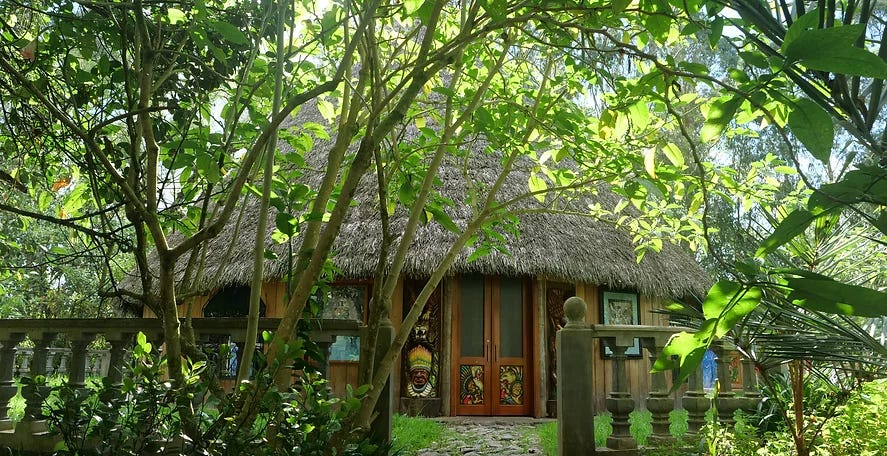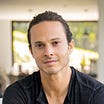Inspire № 3 | Q&A with Natura Care Programs
Bringing attention to the spiritual crisis that underlies addiction.
Today I am sharing the next in a series of dialogues that explores the values and ideas at work on the creative journey. I want to push our understanding of what creativity actually means beyond the narrative of production and consumption that drives the concept of a ‘creator’ in the present age. The team from Natura Care Programs — Alex, Celina and Todd — have collaborated to build a community of healing for addicts in recovery.
The journey of recovery does not end with treatment: it is a living process, ongoing, that requires the patient of addiction to grow beyond the wounded self that seeks solace in a destructive habit. Recovery is a part of oneself that grows into a deeper connection with the world, a more satisfying knowledge of self; above all, it requires emotional retraining, as the source of true fulfillment becomes the presence within.
Many patients come out of rehab with a readiness to start fresh, but with no idea of how to renew their relationship with the world beyond their addiction. What Natura Care Program founders Alex, Todd, and Celina are offering recovering addicts is the space to integrate the work of recovery with a way of being in the world — and, most importantly, a community of peers to support the journey of healing long after the initial treatment.
Can you please share the mission for NCP and what brought it into being?
We offer transformational healing opportunities via a longitudinal spiritual care program rooted in indigenous wisdom, entheogenic ceremonies, evidence-based research, contemplative practice, nature immersion, and peer support.
Fundamentally, we are all interested in a couple of questions:
What healing possibilities may emerge if traditional ayahuasca healing were combined with an interdisciplinary approach to recovery?
How might those who need it most—such as veterans, underrepresented communities, and humans unable to free themselves from unbreakable cycles—benefit from this innovative method?
The inspiration came from a shared vision between Celina De Leon, Todd Youngs, and Alex Olshonsky to create an interdisciplinary approach to recovery.
Celina and other leaders in her organization, Circle of Sacred Nature (CSN), had envisioned an multidisciplinary recovery program for some time. On countless occasions, Celina witnessed individuals remarkably benefit from the responsible engagement with ayahuasca to support their recovery paths.
Teaming up with Todd and Alex to create a comprehensive program was a perfect fit to bring the vision of NCP to life. Both Celina and Todd bring decades of experience working with ayahuasca. Todd and Alex also have invaluable experience enhancing their own recovery paths through the responsible use of ayahuasca — and they are now both mentors to many others in this space.
Todd Youngs is the founder of Recovery Nexus and a pioneer in the use of psychedelics within a 12 Step recovery context. He is also involved in a new psychedelic addiction research center at the University of Washington. Todd has been a beacon of light for many individuals over the years navigating challenges with addiction.
Alex Olshonsky is a writer, former Silicon Valley executive, and the founder of Deep Fix — a newsletter exploring addiction and psychedelics, a somatic coaching practice, and a digital community. Alex’s own recovery from polysubstance addiction rapidly accelerated through in-depth studies of ayahuasca paired with contemplative practices. His years of involvement with Celina’s community have inspired his current work, which combines time-tested healing methods with new technological tools.
The mission and vision of NCP is supported by an experienced advisory board consisting of medical doctors, addiction psychiatrists, psychedelic-assisted therapy researchers, and contemplative social scientists.
One of our core values is ensuring that a program like NCP remains accessible to those who need it most. Thanks to the support of generous philanthropist organizations like Project New Day and Paul Stamet’s Fungi Perfecti, a scholarship fund was developed to provide financial aid to veterans and underrepresented communities.
This program has taken a lot of thought and energy to get off the ground, but the three of us often marvel at how organically NCP’s development has blossomed. At every step, critical items fell into the place — almost as if NCP wanted to happen on its own accord.
What qualities do you feel are vital to the space of addiction recovery that are lacking in mainstream treatment programs?
First, it’s worth clarifying that we do not consider NCP to be an addiction treatment program. NCP is a spiritual care program, ideally geared towards individuals with 30 days of sobriety — although we do take folks with less sobriety on a case-by-case basis.
Our interdisciplinary, holistic paradigm includes individual and group counseling sessions, instruction in contemplative practice, an online educational curriculum, a two-week retreat immersion at the majestic Posada Natura (our sister organization), and six-week individually tailored integration programs.
Responsible use of psychedelics integrated into an interdisciplinary addiction and recovery model is not available in mainstream treatment. We believe our approach will help address the root causes of addiction in ways that conventional addiction treatments simply cannot.
There is often a spiritual crisis underlying addiction, and once that spiritual crisis is addressed, individuals are able to better understand the unconscious factors that contributed to their malaise. Mainstream treatments do not always consider this deeper, spiritual, and existential dimension of addiction. NCP will provide direct experiential learnings on profound topics such as acceptance, surrender, honesty, death, and more.
In addition to providing entheogenic plant sacrament ceremonies in a safe container, NCP is unique in its integration focus. For those with greater need and curiosity, following the ceremonies, we offer the option to join a post-program recovery residence outside of Seattle (Recovery Nexus).
Moreover, another aspect that differentiates NCP: we welcome folks from all recovery paradigms, whether the 12 Steps, Buddhist-based recovery, or any other group. We also understand that there are many individuals suffering from addiction who have never found a home in a recovery community—people we welcome with open arms.
How will patients integrate the somatic experience into the overall pattern of recovery?
We love this question because we believe addiction to be a complex condition of mind, body, spirit, and human relations. So often, the somatic elements of how addiction is held in the human body are overlooked. And tragically, many people suffering from both substance misuse or eating disorders carry a profound sense of body shame.
Our hope is to reinvigorate and nourish our participant’s sense of safety in their own bodies. Instruction in contemplative practices that bring about mindful embodiment is a core part of the NCP curriculum. Additionally, while onsite for the intensive retreat, we offer yoga classes, nature immersion, and group sessions. These activities all engage the body, allowing our participants to attune to bodily intelligence, move stagnant energy, and come into greater somatic coherence.
Moreover, ayahuasca ceremonial work is a fundamentally somatic practice, and our team brings years of training in ceremony facilitation, chaplaincy, somatic psychotherapy, yoga, and mediation to the container.

What role does nature immersion play in healing from addiction?
Too often, addiction tragically misaligns people from their sense of Self and their connection with nature. Our modern society moves at an unnaturally fast pace, providing a cornucopia of chemical numbing and distraction agents to lure people into disconnecting from the grander rhythms of nature and life.
When bringing participants on an intensive two-week retreat at Posada Natura — a stunningly beautiful rainforest with pristine drinking waters, rivers, and wildlife — our intention is to restore a sense of communion with nature’s wisdom. Moreover, our program draws from several South American indigenous lineages, teaching a more holistic, restorative, and healthy way of living with our natural world.
We believe that nature can play a pivotal role in helping people come back to themselves, where they can slow down from society’s “hustle” mentality and drop in with a more rhythmic way of being. In this regard, we simply need to provide a container that allows participants to connect with nature on their own terms.
It is our hope that this connection will not only aid in a person’s recovery from addiction, but will foster a renewed sense of interconnection with all life, thereby, fostering a sense of eco-stewardship and ultimately contributing to planetary well-being.
Could you share something about how the program addresses corollary forms of addiction not directly related to substance abuse?
Process addictions such as gambling, pornography, social media, internet surfing, compulsive work, and eating disorders are overlooked. We believe that addiction does not live in a drug, drink, screen, or meal. It lives within us.
As such, we are committed to helping our participants unburden their deeper societal, relational, and core traumatic wounds. We understand that in working with individuals we also work with family systems and this is woven into our integrative approach.
NCP addresses the root cause of whatever type of addiction is manifesting. Our work is also to illuminate the spiritual crisis that often underlies destructive patterning. Our ethic is rooted in spiritual care and a sincere belief in supporting our participants to flourish, not just recover.
I have a special interest in community-building as a means of integrating the states of consciousness that potentiate true healing. How do you envisage what a community of recovery will look like for patients involved with NCP?
Oftentimes, when people walk away from the afterglow of a ritualized, entheogenic ceremony, they leave with lifelong friends and bonds formed at the deepest level of human relations. The same can be said for the like-minded souls who learn, grow, and heal together as part of a recovery community.
One reason we are particularly excited about NCP is because it combines all of these communities and more. We offer the deep bonds formed via ceremonial experiences and recovery growth combined with an online learning platform and community engagement tool.
Whether our participants choose to stay at Posada Natura in Costa Rica or Recovery Nexus in Seattle or choose to go home, they will be connected through a technological communication platform, which is truly the bright side of our often abused digital world.
Our hope is to create a thriving community of like-minded individuals dedicated to healing, spiritual growth, and reciprocity.
You can read find other dialogues in the Inspire series on this page.


